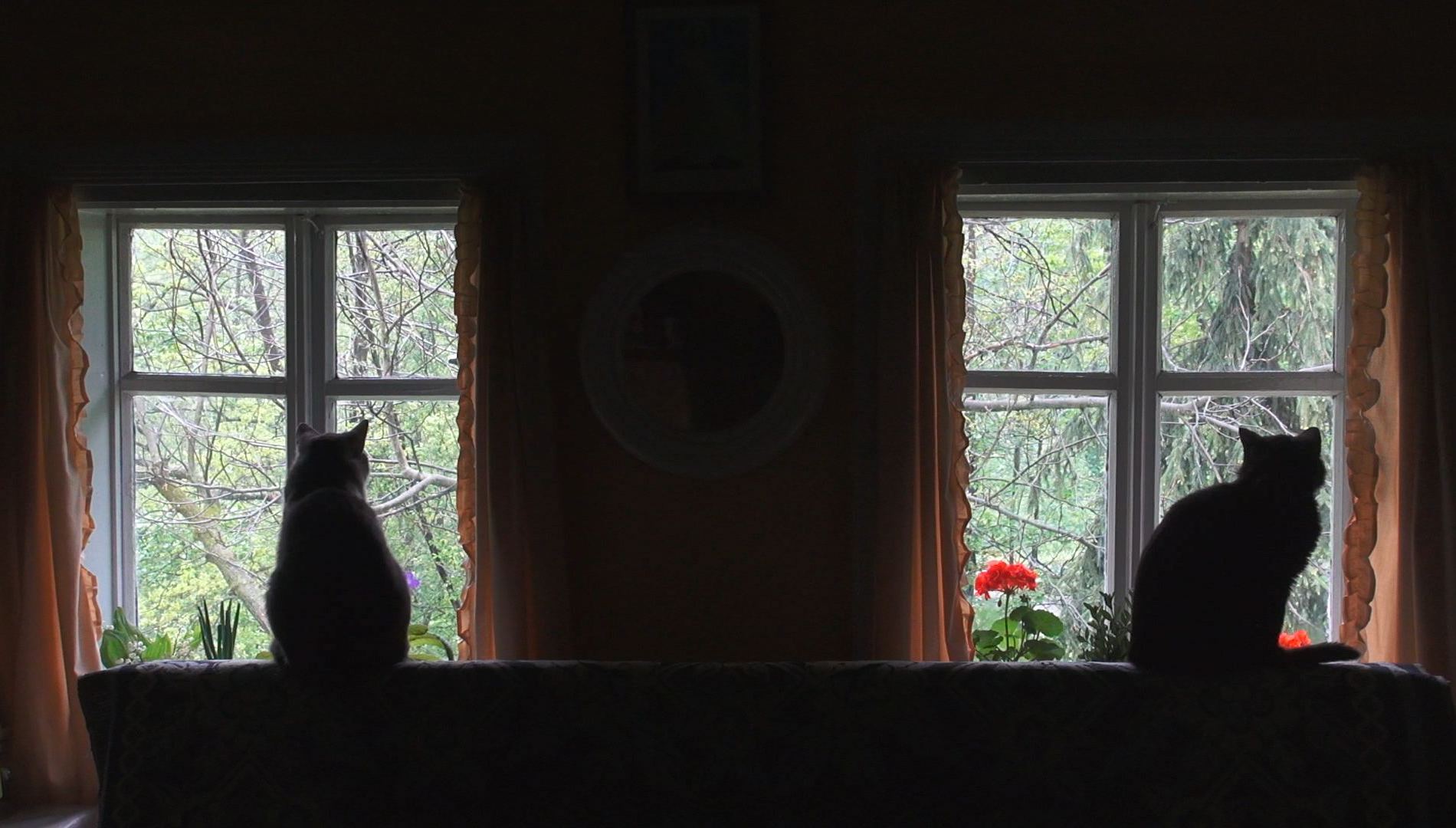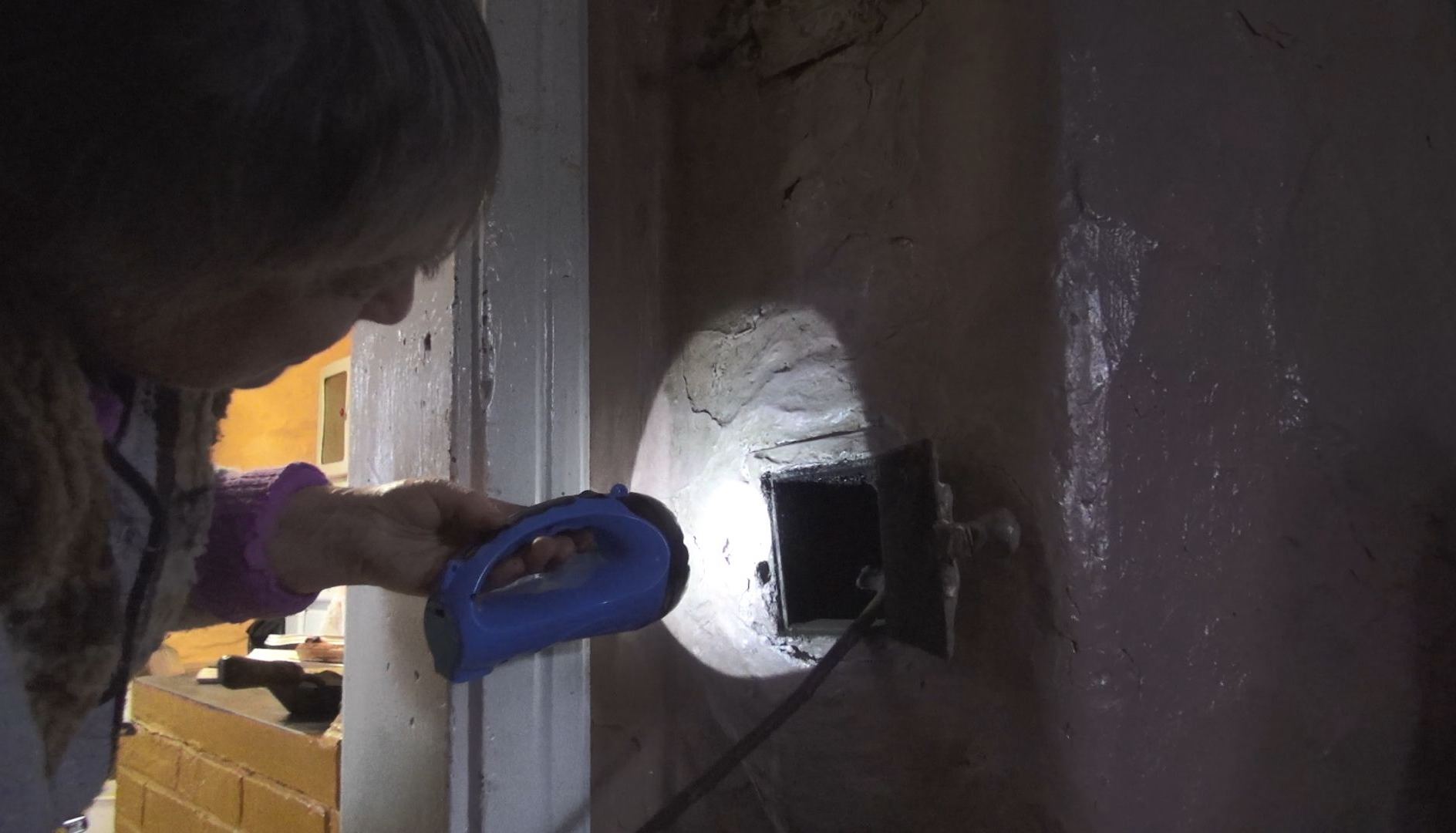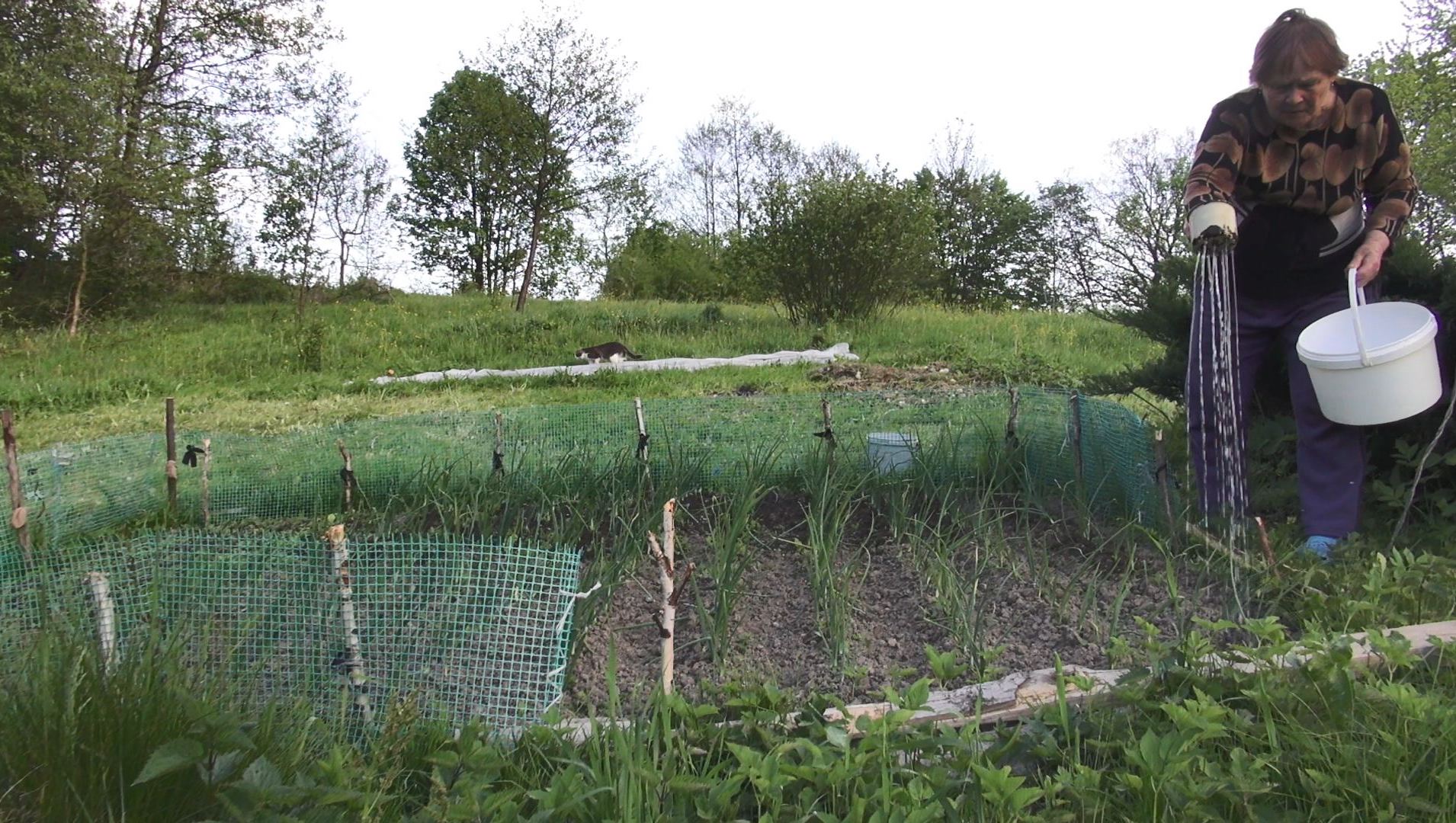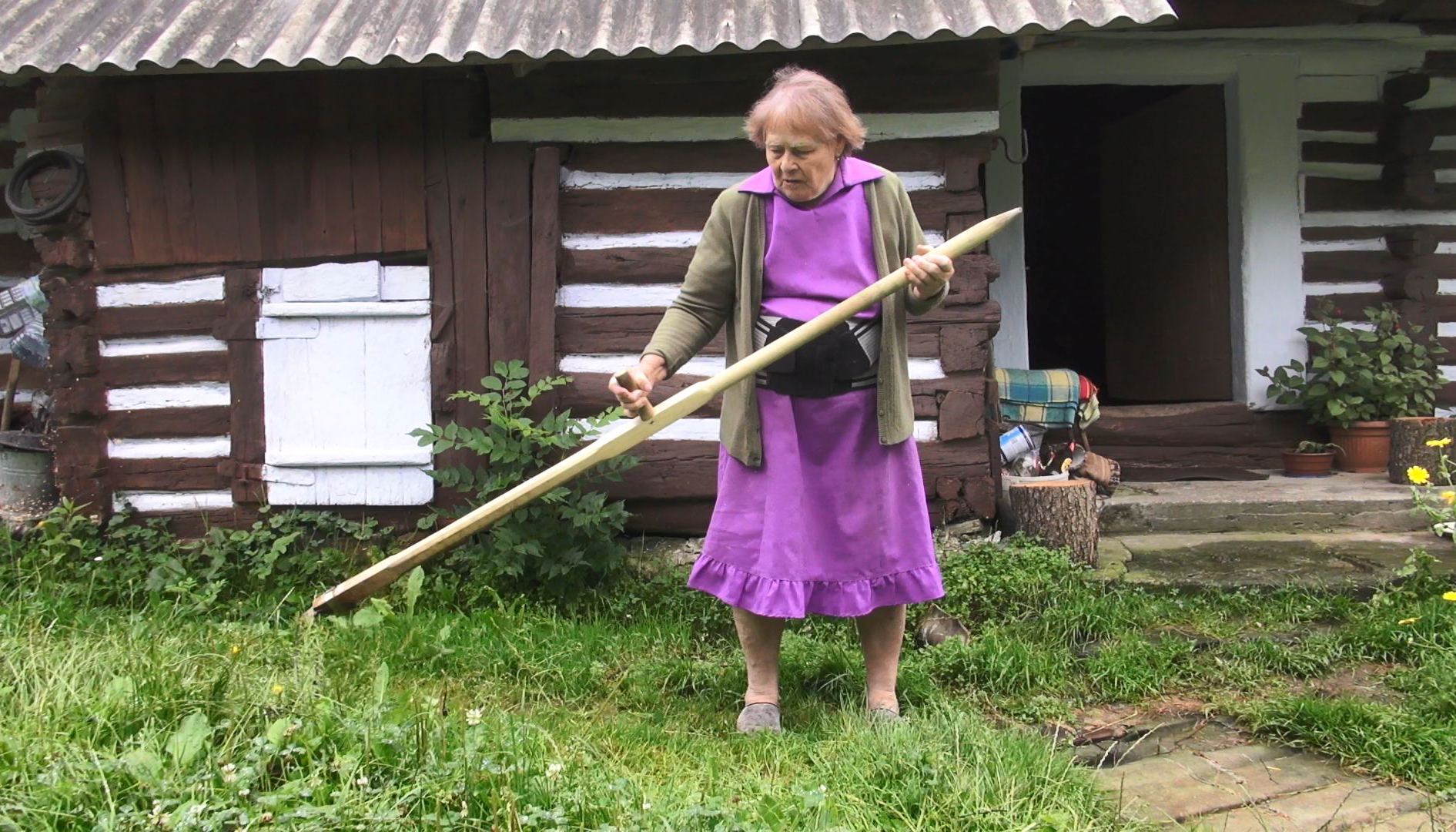#4—
Alice LYONS & Justyn HUNIA
ROSEHIP SYRUP
My collaboration with Alice LYONS at PHONICA #8 in Dublin was a sort of a performative reading of her poem ‘ROSEHIP SYRUP,’ which was inspired by her visit to the over 200-years old wooden cottage of my grandmother in the hills of south-east Poland. Alice’s poetic meditation was a partially imaginative, partially documentary account of that visit.
What struck me in Alice’s poem was its iconicity—its bifurcated layout represents the physical layout of the human section of the cottage (the other one being the animal section under the same roof, which was a characteristic feature of the local wooden architecture). Just as the human section of the house consists of a kitchen and a bedroom divided by an old stove that doubles up as a sort of a partition wall, the poem is divided into two stanzas dissected by a single line. As a result, each stanza is a representation of a separate room, whereas the line in between emblematizes the partition wall.
We decided to reflect that division in our performance. Alice read the first stanza at a go sitting on the leftmost of three chairs, then she moved to the middle chair to recite the “partition” line, only to move to the rightmost chair to read the second stanza (with each chunk interspersed with my video sequences). What emerges as a result was a sequence of iconic relationships, which could be summed up with the following statement: performance is the poem, the poem is a house, the house is Amelia’s body (as suggested by a line in the poem).
Rounding off the performance was the song sang on the screen by Amelia, who was accompanied by me and Alice singing along. This gesture could be seen as the poem’s three human presences converged in the performance—Alice’s physical presence on stage was emblematic of the voice speaking in the poem, my presence was related to the grandson from the poem, and we had the voice of the poem’s main protagonist, Amelia. Through the fusion of poetry, singing, and film art forms we created a somewhat vicarious, performative unity of place and action.
![]()
![]()
Let me end by saying a few words about my long-standing cultural / literary exchange and friendship with Alice. Our acquaintance was born out of collaborative translation and became for me a life-changing experience. Her first invitation for me to come and mind her house in the village of Cootehall, county Roscommon, one facing the barracks from John’s McGahern’s eponymous novel, gave me my first real-life encounter with the country that had fascinated me for some time – little did I realize those 2 days and nights spent on a bus from Cracow to Dublin (there being no cheap flights then!) will bring me so many more days and nights and thrills of discovery, making Ireland something of my second home. Alice’s insatiable curiosity about Poland and Eastern European experience inspired me to question and discover so much about my own culture, which is the paradox I am particularly fond of. As I rightly assumed, Alice, a true seeker of the genuine and authentic, would appreciate getting to know my grandmother, her historic peasant cottage and her unique lifestyle. What I got in return was a wonderful gift of poetry that immortalizes this poor wooden cottage while hinting at all the richness it conceals.
—Justyn HUNIA
![]()
T
HUNIA & LYONS’ performance
can be seen in full here...
Alice LYONS
ROSEHIP SYRUP
Her old timber house was slung low and leaned into the hillside so the tin roof
and the tall grass kissed in summer. The rosehips were puckering on the
rosebushes waiting to be picked. The roses had imploded to an essential
concentration. Rose had been ordered by impending Autumn to make a backup
copy in a rosehip. They lay smoldering acidly and ingrown on the rosebushes of
Wola Komborska beside the old walnut tree where Amelia’s popular walnuts were
ripening. Amelia at eighty eyed all this progress. She shooed thin cats from the
beetroots gathered rosehips to boil steamily towards a reduction of rosehip syrup
on her massive stove that undulating organ of woodfire painted a glossy roseflesh
colour.
Also a room divider.
In the sleeping side her grandson pried his white laptop like an oyster to emit
great light & the luminous human head of Czesław Miłosz trilling the r’s in
‘Europe’ po Angielsku on a podcast. There was an ardent annoyance of rodentine
scratching deep in the maché mortars of the walls of her house which is also her
body. The old poet snared her attention for a moment his overhanging eyebrow
sheaves snagging in his lashes like her laundry snagged in the woodpile in winter
winds. His wizened lips took foreign shapes. Weather eye on the sky she took up
her scythe beside the deep oak threshold marched out to lift onions spread a wet
coat on the woodpile plunk a tin tub under low eaves for caught washing water.
The sky. The scythe was half-mooned in it. She stood & surveyed. Then trimmed
grass and waved bye with her scythe as we headed out for Haczów its wooden
church & heritages.
SYROP Z DZIKIEJ RÓZY
Jej chyląca się ku ziemi stara chata wtulała się w stok, tak że latem blaszany dach całował się
z wysokimi trawami. Na głogach marszczyły się owoce, czekając na zerwanie. Róże zdążyły
zapaść się w sobie w skoncentrowaną esencję. Nadchodząca Jesień zawczasu kazała im
wykonać kopię zapasową w krzaku głogu: płożyły się i tliły cierpko, wrośnięte w głogi Woli
Komborskiej koło wiekowego drzewa, na którym dojrzewały słynne na całą okolicę orzechy
Amelii. Amelia, która widziała już osiemdziesiąt wiosen, teraz obserwowała cały ten proces.
Przegoniwszy z buraków chude koty, narwała głogu, by w kłębach pary ugotować gęsty syrop
na swoim wielkim piecu—tej pomalowanej na cielisty róż roztętnionej katarynce ognia z
rozpalonych drew.
Służącym też za ścianę działową.
W części sypialnej jej wnuk rozwarł swojego laptopa niczym ostrygę, emitując łunę światła
i promienną ludzką głowę Czesława Miłosza, recytującą z wibrującym „r” angielską wersję
„Europy” na podkaście. Gdy głęboko pod podobną do papier mache masą na ścianach jej
domu—który jest też jej ciałem—rozległ się gryzoni chrobot, zapanowała ognista irytacja.
Sędziwy poeta na chwilę przykuł jej uwagę – obwisłe snopy jego krzaczastych brwi zaplątały
mu się w rzęsy tak jak w zimowym wietrze jej pranie zahacza o stosy opałowych szczap. Jego
pomarszczone wargi nabrały obcych kształtów. Rwanie w kościach kazało jej porwać za kosę
opartą o masywny dębowy próg i żwawym krokiem wyjść narwać cebuli rozłożyć na stercie
szczap mokry płaszcz cisnąć z brzękiem pod niski okap metalową balię na deszczówkę do
prania. Niebiosa. I wpisany w nie półksiężyc—kosa. Amelia przystanęła rozglądając się
badawczo. Po chwili przystrzygła trawę i pomachała kosą na pożegnanie—wyjeżdżaliśmy do
Haczowa, z drewnianym kościołem i całym tym dziedzictwem.
Translated by
Justyn HUNIA
transl. Justyn Hunia
Alice LYONS
Words circulating
in space and time
‘Portrait of a Woman’
... a poem by Polish Nobel Laureate Wisława SZYMBORSKA,
brought Justyn Hunia and me together.
She must come in many varieties.
To change so that nothing ever changes.
It’s easy, impossible, hard, worth trying.
Her eyes are, as needed, now deep blue, now grey,
dark, playful, brimming for no reason with tears.
She sleeps with him like a one-night stand, like his one and only.
With him, she will have four children, no children, one.
Naïve, yet giving the best advice.
Weak, yet able to bear anything.
Has no head on her shoulders, but will have.
Reads Jaspers and ladies magazines.
Doesn’t know what this screw is for and will build a bridge.
Young, as usual young, as always still young.
Holds in her hands a little sparrow with a broken wing,
her own money for a journey long and distant
a meat-cleaver, a poultice and a shot of vodka.
Where is she running like that, isn’t she tired?
Not at all, just a bit, very much, it’s not a problem.
Either she loves him or is determined to.
For better, for worse, and for heavens sake. †
I read this astonishing poem sometime in the early 2000s, and I wanted to try a new translation into English. Friends of friends in the literary world of Kraków suggested translator & poet Justyn HUNIA as a potential collaborator. Our early, tentative, formal emails about how we might co-translate SZYMBORSKA soon relaxed into a friendly and inquisitive correspondence. Justyn said he was learning to bake, so I emailed a recipe for carrot cake. I began what has become a lifetime practice of picking Justyn’s brain about Polish literature and history. He was never stinting in his responses. Once I asked him about an unusual flavour of ice cream I’d seen in Poland, and his email reply is characteristic:
Words circulating
... is a good way to characterise the friendship that has grown from that first poem, (which we did translate and published in Poetry Ireland Review).
Since then Justyn has visited Ireland many times to stay with me and the many friends he has made here. And I’ve been to Poland on many’s a road trip with Justyn and friends, including the trip we took to stay with his remarkable grandmother Amelia in her old cottage near the border with Ukraine, where our collaboration on ROSEHIP SYRUP was born.
Years ago, Justyn began making sound and video documents of Amelia’s life because, in addition to his personal love of his granny, he also recognised that her songs, farming and cooking practices, her blend of old folk and 20th century Catholic beliefs were all part of a fading world. He wanted to capture it. He has since amassed an enormous Amelia Archive, and we drew on that when we decided to produce an audio-visual response to my poem ROSEHIP SYRUP.
![]()
![]()
![]()
![]()
![]()
On a screen above the two of us sitting on the Smock Alley stage, Justyn projected footage from his archive of Amelia: she kneads dough and places it in the huge clay oven that is the beating heart of her cottage. She brushes her hair and regards her face in an old mirror. His camera captures thin bars of morning sunlight as they break through the joists in the cottage attic. We see Justyn scrub Amelia’s back as she takes her ‘shower’ in a tin washing tub with water heated on her stove.
![]()
Translation, as Justyn lives it, is a multi-disciplinary practice. He makes his living through words, translating historical and literary texts from English to Polish. But, through his documentary sound and video practice, he also translates space and time, bringing his forays into the past, via Amelia, to our present, helping us decipher it and our current situations.
Just as Amelia’s cottage has two rooms, bifurcated by the clay stove, our performance ROSEHIP SYRUP brought together two ‘sides’ of one story: Amelia. We tried to knit together Justyn’s ‘side’ as grandson, as documentarian, translator, ‘insider’ to both a family and a rich, rural culture and my ‘side’ as visitor, friend, poet, exile from suburbia, and ‘outsider’. Our final act, singing ‘with’ Amelia (above us, onscreen) was an effort, with the assistance of technologies, to sing across space and time.
... a poem by Polish Nobel Laureate Wisława SZYMBORSKA,
brought Justyn Hunia and me together.
She must come in many varieties.
To change so that nothing ever changes.
It’s easy, impossible, hard, worth trying.
Her eyes are, as needed, now deep blue, now grey,
dark, playful, brimming for no reason with tears.
She sleeps with him like a one-night stand, like his one and only.
With him, she will have four children, no children, one.
Naïve, yet giving the best advice.
Weak, yet able to bear anything.
Has no head on her shoulders, but will have.
Reads Jaspers and ladies magazines.
Doesn’t know what this screw is for and will build a bridge.
Young, as usual young, as always still young.
Holds in her hands a little sparrow with a broken wing,
her own money for a journey long and distant
a meat-cleaver, a poultice and a shot of vodka.
Where is she running like that, isn’t she tired?
Not at all, just a bit, very much, it’s not a problem.
Either she loves him or is determined to.
For better, for worse, and for heavens sake. †
I read this astonishing poem sometime in the early 2000s, and I wanted to try a new translation into English. Friends of friends in the literary world of Kraków suggested translator & poet Justyn HUNIA as a potential collaborator. Our early, tentative, formal emails about how we might co-translate SZYMBORSKA soon relaxed into a friendly and inquisitive correspondence. Justyn said he was learning to bake, so I emailed a recipe for carrot cake. I began what has become a lifetime practice of picking Justyn’s brain about Polish literature and history. He was never stinting in his responses. Once I asked him about an unusual flavour of ice cream I’d seen in Poland, and his email reply is characteristic:
Just a quick linguistic impression… you asked about “Lody Bakaliowe”—ice cream with nuts and dried fruit, mainly raisins. Led by curiosity I decided to check its etymology only to find out it came to Poland from the Ottoman Empire. We used to border on it and fought many battles with the Turks and borrowed a bunch of words from them, mainly military, interior and dress vocabulary. “Bakkal” means “grocer” in Turkish,Turks in turn took this word from Arabic, and Arabs were inspired by the Latin word “bacca”—berry! It’s funny how words circulate in space and time.
Words circulating
in space and time
... is a good way to characterise the friendship that has grown from that first poem, (which we did translate and published in Poetry Ireland Review).
Since then Justyn has visited Ireland many times to stay with me and the many friends he has made here. And I’ve been to Poland on many’s a road trip with Justyn and friends, including the trip we took to stay with his remarkable grandmother Amelia in her old cottage near the border with Ukraine, where our collaboration on ROSEHIP SYRUP was born.
Years ago, Justyn began making sound and video documents of Amelia’s life because, in addition to his personal love of his granny, he also recognised that her songs, farming and cooking practices, her blend of old folk and 20th century Catholic beliefs were all part of a fading world. He wanted to capture it. He has since amassed an enormous Amelia Archive, and we drew on that when we decided to produce an audio-visual response to my poem ROSEHIP SYRUP.





On a screen above the two of us sitting on the Smock Alley stage, Justyn projected footage from his archive of Amelia: she kneads dough and places it in the huge clay oven that is the beating heart of her cottage. She brushes her hair and regards her face in an old mirror. His camera captures thin bars of morning sunlight as they break through the joists in the cottage attic. We see Justyn scrub Amelia’s back as she takes her ‘shower’ in a tin washing tub with water heated on her stove.

Translation, as Justyn lives it, is a multi-disciplinary practice. He makes his living through words, translating historical and literary texts from English to Polish. But, through his documentary sound and video practice, he also translates space and time, bringing his forays into the past, via Amelia, to our present, helping us decipher it and our current situations.
Just as Amelia’s cottage has two rooms, bifurcated by the clay stove, our performance ROSEHIP SYRUP brought together two ‘sides’ of one story: Amelia. We tried to knit together Justyn’s ‘side’ as grandson, as documentarian, translator, ‘insider’ to both a family and a rich, rural culture and my ‘side’ as visitor, friend, poet, exile from suburbia, and ‘outsider’. Our final act, singing ‘with’ Amelia (above us, onscreen) was an effort, with the assistance of technologies, to sing across space and time.
She must be all-in-one.
Justyn HUNIA, English-Polish translator of fiction, non-fiction and poetry, co-founder of avant-rock band GARGANTUA, based in Kraków, Poland. Recently his long-standing documentary film project set in remote village in south-east Poland (of which all stills above are excerpted) was shown as work-in-progress at Phonica in Dublin (2018) and Mallorca (2019)
Alice LYONS’ most recent book is OONA (Lilliput, 2020), a novel. Author of three collections of poetry, she is recipient of the Patrick Kavanagh Award and the inaugural Ireland Chair of Poetry Bursary awarded by Nuala Ní Dhomhnaill. She is Lecturer in Writing + Literature, YAADA, IT Sligo..
† Translated by Justyn HUNIA and Alice LYONS,
first published in Poetry Ireland, Issue 82, p. 29
HUNIA and LYONS’ performance
was photographed on the night
by Olesya ZDOROVESTSKA
All other images,
© Justyn HUNIA
†
Alice LYONS’ most recent book is OONA (Lilliput, 2020), a novel. Author of three collections of poetry, she is recipient of the Patrick Kavanagh Award and the inaugural Ireland Chair of Poetry Bursary awarded by Nuala Ní Dhomhnaill. She is Lecturer in Writing + Literature, YAADA, IT Sligo..
† Translated by Justyn HUNIA and Alice LYONS,
first published in Poetry Ireland, Issue 82, p. 29
HUNIA and LYONS’ performance
was photographed on the night
by Olesya ZDOROVESTSKA
All other images,
© Justyn HUNIA
†



